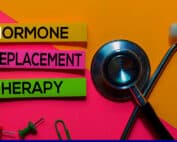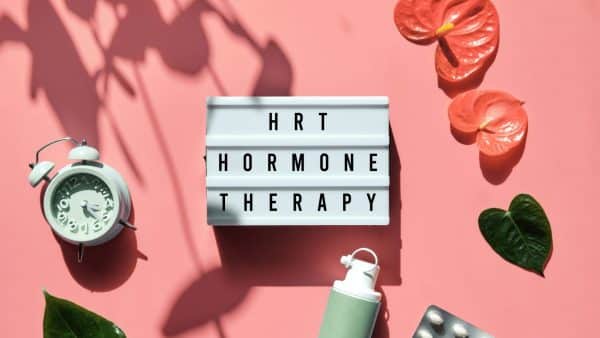Featured
New Insights On Hormone Replacement Therapy
In 2002, many women on Hormone Replacement therapy (HRT) went off HRT due to the fear of risk from breast cancer, heart attack and stroke. The average age of the women in the Women’s Health Initiative (WHI) was 63 and they were on high doses of synthetic hormones taken orally.
We have learned a lot since then. There were only 8 cases of breast cancer yet the risk of osteoporotic fractures, and colon cancer were decreased and so was death from other causes in the WHI study.
Leading Causes of Death and Disability
- Coronary heart disease is the leading cause of death.
- Colorectal carcinoma is the third-most common cancer in the world. It is the second-most common cause of cancer-related mortality after only lung cancer.
- Colon cancer is the second leading cancer in women.
- Half of all women over the age of 50 will experience an osteoporosis-related fracture at some point in their lifetime
- 1 in 9 people will develop dementia whereas 1 in 8 may develop breast cancer (and most are not on hormones since women in menopause make some estrogen in their fat and adrenal glands but it is not the type of estrogen that is protective).
- In Western nations, 10–20 % of hip fracture patients are institutionalized following fracture.
Giving estrogen through the skin makes the risk of clots that caused heart attack and stroke negligible. The American Heart Association now has some evidence that estrogen is protective against heart disease and has beneficial effects on lipids. The type and route of administration of estrogen makes a difference in side effects.
Risk of NOT Replacing Hormones
With that said, loss of hormones can increase the risk of cardiovascular disease, osteoporosis and fracture and dementia. Loss of hormones causes a loss of the quality of life. Women gain weight, can’t sleep, have hot flashes, get frequent urinary tract infections, lose bone and develop osteoporosis, have cognitive impairment and an increased risk of dementia and cardiovascular disease. They needed support and re assurance to make a case that their quality of life matters.
They want to feel like themselves again, have energy, clarity, strong bones, deep restful sleep, freedom from hot flashes, their libido intact and a silky smooth vagina allowing sex to be enjoyable. The fear of hormone replacement kept them from realizing these goals. Even though many practitioners have been providing relief to women, the medical societies have finally blessed the use of hormones and recognized that the benefits outweigh the risk in most cases.
North American Menopause Society’s Position Statement
The North American Menopause Society (NAMS) released a position statement in 2022 and highlights from the NAMS 2022 Hormone Therapy Position Statement include
- Hormone therapy remains the most effective treatment for vasomotor symptoms (hot flashes) and the genitourinary syndrome of menopause (dry vagina and frequent urinary tract infections) and has been shown to prevent bone loss and fracture.
- Personalization with shared decision-making remains key, with periodic reevaluation to determine an individual woman’s benefit-risk profile, with recommendations for the use of the appropriate dose, duration, regimen, and route of administration required to manage a woman’s symptoms and to meet treatment goals.
- Risk stratification by age and time since menopause is recommended. (The best results are when you are less than 10 years past menopause, the sooner you start the better)
- The benefits of hormone therapy outweigh the risks for most healthy symptomatic women who are aged younger than 60 years and within 10 years of menopause onset.
- Transdermal (through the skin) routes of administration and lower doses of hormone therapy may decrease risk of venous thromboembolism and stroke.
- Women with primary ovarian insufficiency and premature or early menopause have higher risks of bone loss, heart disease, and cognitive or affective disorders associated with estrogen deficiency. It is recommended that hormone therapy can be used until at least the mean age of menopause unless there is a contraindication to its use.
- There is a paucity of randomized, controlled trial data about the risks of extended duration of hormone therapy in women aged older than 60 or 65 years, although observational studies suggest a potential rare risk of breast cancer with increased duration of hormone therapy.
- For select survivors of breast and endometrial cancer, observational data show that use of low- dose vaginal estrogen therapy for those who fail nonhormone therapy for treatment of genitourinary symptoms (dry vagina that makes sex painful and dry urethra leading to frequent urinary tract infections) appears safe and greatly improves quality of life for many.
- Breast cancer risk does not increase appreciably with short-term use of estrogen-progestogen therapy and may be decreased with estrogen alone. (Of note is that the E3N study showed a decreased risk of breast cancer using bioidentical progesterone, progestogens are synthetic.)
- Compounded bioidentical hormone therapy presents safety concerns, such as minimal government regulation and monitoring, overdosing or underdosing, presence of impurities or lack of sterility, lack of scientific efficacy and safety data, and lack of a label outlining risks. (Pharmacies are not regulated by the FDA and have their own governing body and quality assurance measures. There are cases when a person needs a specific dose or route of administration because they cannot take manufactured pharmaceuticals so these products may be helpful in certain cases)
- Hormone therapy does not need to be routinely discontinued in women aged older than 60 or 65 years and can be considered for continuation beyond age 65 for persistent VMS (vasomotor symptoms -hot flashes), quality-of-life issues, or prevention of osteoporosis after appropriate evaluation and counseling of benefits and risks.
- For women with GSM (genitourinary symptoms of menopause – dry vagina, frequent urinary tract infections), vaginal estrogen (and systemic if required) or other non-estrogen therapies may be used at any age and for extended duration, if needed.
These statements have been endorsed by more than 20 well respected international organizations. What is in parenthesis is my clarification. Hopefully this takes some of the fear out of how to decide if Hormone Replacement Therapy is right for you. Apply for a free no obligation consultation to see if we are a good fit. You can get your life back and be slim, sharp, sexy and supercharged!
 Lorraine Maita, MD, CEO & Founder of The Feel Good Again Institute and Vibrance for life and widely known as “The Hormone Harmonizer”, has helped thousands of people ditch fatigue, brain fog, mood swings, lose weight, and achieve balanced hormones so they Feel Good Again.
Lorraine Maita, MD, CEO & Founder of The Feel Good Again Institute and Vibrance for life and widely known as “The Hormone Harmonizer”, has helped thousands of people ditch fatigue, brain fog, mood swings, lose weight, and achieve balanced hormones so they Feel Good Again.
She is a recognized and award-winning triple board certified, holistic, functional, integrative and anti-aging physician, speaker and author, and has been featured in ABC News, Forbes, WOR Radio and many media outlets to spread the word that you can live younger and healthier at any age.





